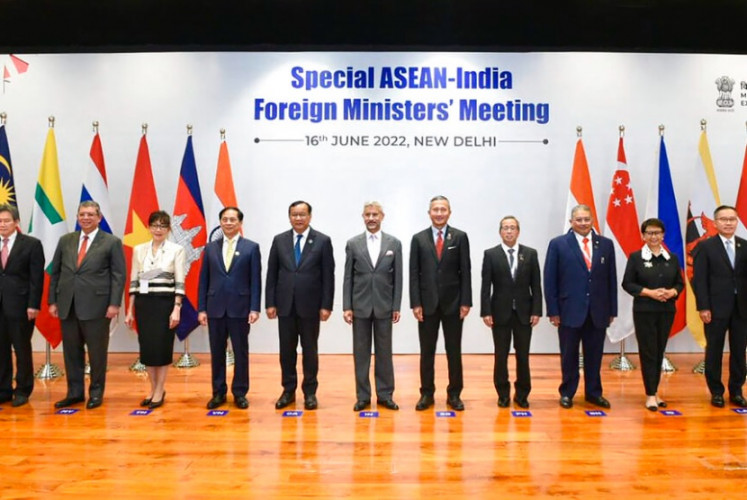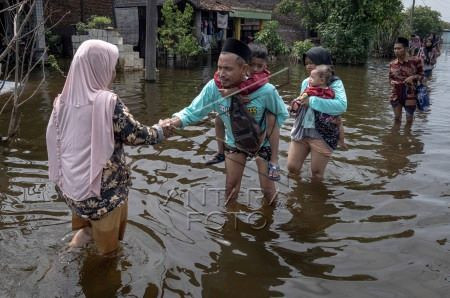INSIGHT: Fisheries strategies to address transnational organized crime
Change Size
 Big fish, small loans: East Java deputy governor Saifullah Yusuf (from right to left), Bank Mandiri president director Kartika Wirjoatmodjo and Kelola Mina Laut CEO Mohammad Nadjikh show off a fish at the Brondong fish auction house in Lamongan, East Java, on Thursday. Bank Mandiri continues to channel micro business loans (KUR) to micro business players including fishermen, with total loans to 225,000 borrowers of Rp 8.79 trillion (US$680 million) in its KUR portfolio as of September this year, around 67 percent of this year’s target. (JP/Dhoni Setiawan)
Big fish, small loans: East Java deputy governor Saifullah Yusuf (from right to left), Bank Mandiri president director Kartika Wirjoatmodjo and Kelola Mina Laut CEO Mohammad Nadjikh show off a fish at the Brondong fish auction house in Lamongan, East Java, on Thursday. Bank Mandiri continues to channel micro business loans (KUR) to micro business players including fishermen, with total loans to 225,000 borrowers of Rp 8.79 trillion (US$680 million) in its KUR portfolio as of September this year, around 67 percent of this year’s target. (JP/Dhoni Setiawan)
F
or more than two decades, illegal, unregulated and unreported fishing (IUUF) has been treated as a fisheries management issue. And yet, the traditional response is lacking. Grouper, a very common fish, has collapsed off West Africa, yellowfin tuna is 95 percent overfished in regions of the Indian Ocean and striped marlin is 60 percent overfished in the same waters.
Sadly there is a possibility that there will be no more yellowfin in some parts of the Indian Ocean in 2020 if unsustainable practices continue. Meanwhile, as fish stocks drop, the international community continues to debate whether IUUF is an act of uncontrolled small scale subsistence fisheries, and the extent that criminal activities contribute.
Despite the intricacies of the debate, the fact is that there are examples where sophisticated criminal networks have been found operating in the fisheries sector. A recent case in point was when 700 Myanmar citizens were trafficked by a criminal organization operating a British Virgin Island-registered fishing fleet in the Aru Sea of Indonesia. Those who can afford to set-up a company in a flag-of-convenience jurisdiction, maintain long range fishing vessels, recruit and traffic hundreds of men, take untold tons of fish in foreign waters and sell the catch in the global market, are not your typical small-time fisherman.
While the scale of illegal activity in the fisheries sector is hard to determine, there are indications it is significant. The moratorium imposed by Indonesia on foreign fishing vessels has found that approximately 1,100 ships licensed to operate in Indonesia had committed different forms of fraud. In many cases, licenses were duplicated, which could mean thousands of vessels were in place illegally. It is also alleged that some have been involved in the smuggling of endangered species, including birds, parrots and turtles.
And while not all IUUF activities are considered a form of organized crime, the fact is that there are associated crimes that take place alongside the value chain in the fisheries industry and the international community is in a position to legitimately refer to fisheries crime or fisheries-related crimes.
The terminology is also similar to existing language used by the international community to describe environmental crime generally, including wildlife and forest crime. Referring to the range of criminal activities in the fisheries sector not limited to the illegal harvesting of natural resources from the sea can also be considered.
Importantly, the poaching and trading species listed in annexes I and II of the Convention on International Trade in Endangered Species (CITES) is considered a criminal act, so it should not be a significant challenge for the international community to treat related IUUF as a criminal activity.
Similar to other forms of environmental crime, including wildlife and forest crime, some fisheries crimes have also become transnational and organized. It is really then in the interest of the international community to address transnational organized crime in the fishing industry.
From an international legal perspective, the relationship between IUUF and transnational crime was identified at the ninth meeting of the UN Open-ended Informal Consultative Process on Oceans and the Law of the Sea (UNICPOLOS) and the meeting of the Conference of Parties to the UN Convention against Transnational Organized Crime in 2008.
In 2010, the UN General Assembly adopted a resolution on sustainable fisheries that asked states to look into “possible connections between international organized crime and illegal fishing in certain regions of the world”. The point is that momentum is building internationally to consider the connection of illegal fishing and transnational organized crime.
But the fight against IUUF is not without a timeline. Data on the decline of some species are not in dispute, and importantly the recently adopted UN Sustainable Development Goals include a provision that IUUF should be addressed by 2020. Specifically, goal 14 recommends that states “effectively regulate harvesting and end overfishing, illegal, unreported and unregulated fishing and destructive fishing practices, and implement science-based management plans in order to restore fish stocks in the shortest time feasible, at least to levels that can produce maximum sustainable yield as determined by their biological characteristics”.
We have four years to make this target a reality. To succeed, efforts in the management of the fishery sector need to integrate effective criminal justice responses, especially when the involvement of organized crime is found.
Regional fisheries management organizations need to be equipped to identify beneficial owners of vessels, expose corruption, protect trafficking victims and connect information to other crimes in the fisheries sector. The international community needs to act together to address fisheries crime, especially transnational organized fisheries crime, before time runs out.
______________________________________
Arif Havas Oegroseno is a deputy to the coordinating maritime affairs minister. Jeremy Douglas is the regional representative of the UN Office on Drugs and Crime for Southeast Asia and the Pacific.








